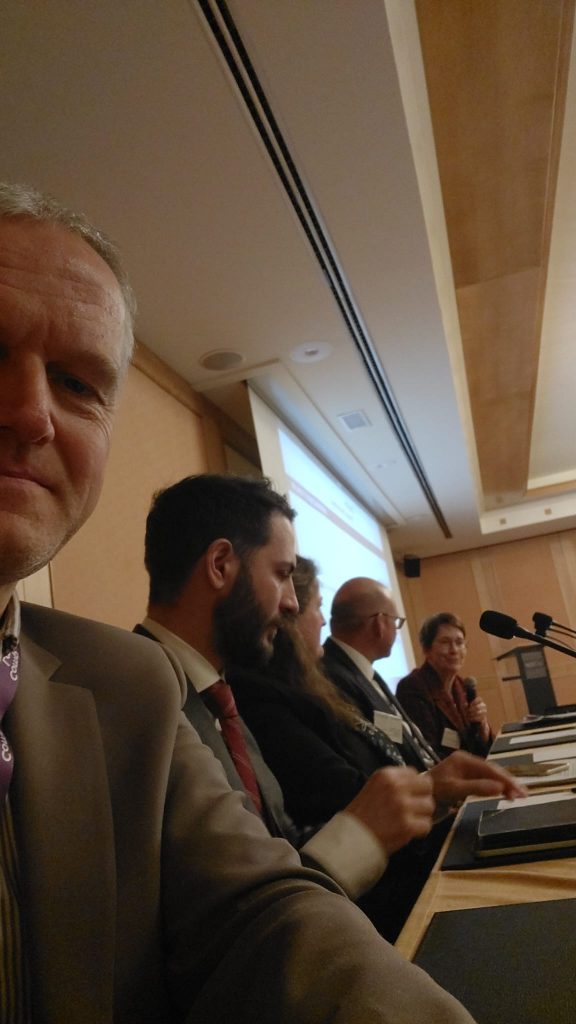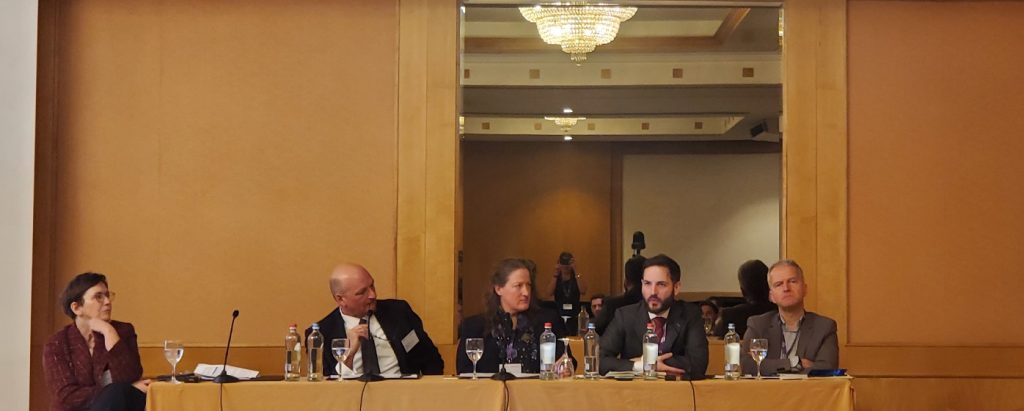
Don’t You (Forget About Me)
PDF-Version: Click here
Suggested Citation: Klumpe, DKartJ 2024, 4-6
Dr. Gerhard Klumpe, one of Germany’s best-known antitrust judges, discussed private antitrust enforcement in leading jurisdictions in Brussels. For our blog D’Kart, the presiding judge at Dortmund Regional Court describes his impressions of international trends in private enforcement.
Don’t You (Forget About Me) – not only is this Simple Minds anthem familiar to anyone who grew up in the 1980s, it is also the defining music of the film The Breakfast Club, in which five people meet in the morning to talk about profound problems and reveal a lot about themselves or their experiences.
The set-up at breakfast in Brussels
Reminiscent of precisely this scene was the meeting of four judges and their moderator for breakfast at Le Chatelain in Brussels on the occasion of the CompLaw: Private Enforcement 2024 event organized there by Informa Connect. While the coffee, tea and rolls were supposed to be just a final vote on the following panel, entitled Judges’ Roundtable, the discussion of the substantive issues started immediately instead, and was so lively that the participants almost missed the start of the event. However, it only took a few steps to move to the actual event hall and simply continue the discussion there in front of the interested audience.
The breakfast club meeting here at the Judges Round Table consisted of representatives from the currently most important forums for antitrust damages actions, namely from the Netherlands (Elske Boerwinkel, NCC District Court), Spain (Gustavo Andrés Martín Martin, Commercial Court n.1 Alicante), the UK (Ben Tidswell, Chairman Competition Appeal Tribunal) and Germany (the author of these lines here), moderated by none other than Dorothy Hansberry-Bieguńska (Hansberry Tomkiel, Poland).
First, a brief overview of the legal issues that have since been resolved by the case law of the ECJ and the national (supreme) courts was provided, including a discussion of recent case law developments such as the 15 decisions of the Tribunale Supremo (TS) and the well-known CAT decision (Royal Mail Group Ltd. v DAF Trucks Ltd., judgment of 07.02.2023, [2023] CAT 6). Gustavo Martin also announced the imminence of further decisions by the TS in the coming weeks, which would promise further clarification, particularly with regard to determining the amount of damages. This kicked off the discussion of the continuing problems of antitrust damages claims.
In all jurisdictions, the focus is on two issues: firstly, the handling of large-volume (class) actions. Secondly, there is the question of how the extent of damages is determined. This question is paired with the question of how to introduce economic or econometric expertise into the legal dispute as well as the treatment and evaluation of such expert opinions (and possible alternatives).

Dealing with large-volume (class) actions
With regard to the first aspect, while in the UK and the Netherlands cartel damages are almost always pursued in the form of bundled claims, in Spain small and very small claims are predominant. In addition, there is a certain skepticism with regard to class actions – similar to Germany, where both approaches are known to exist.
Nevertheless, from the perspective of all those involved in the panel, it seemed likely that the bundling of claims will be the main way of pursuing claims in the future, if only to generate data more easily and comprehensively and, of course, due to better litigation funding options. In the Netherlands, in addition to the assignment models that are also being discussed in Germany, there is also the option of bundling claims by the courts themselves. In addition, Dutch procedural law has also provided for the possibility of bundling claims since 2020 (see Klumpe/Weber NZKart 2021, 492 et seq. on the situation there). Nevertheless, the assignment model – which has not yet been confirmed by the highest court in the Netherlands either – remains predominant here too.
The scope of the claim bundles is already enormous in the lawsuits currently pending. In the Netherlands, one of the proceedings before the Rechtbank Amsterdam in the truck cartel involves more than 200,000 purchase transactions. In Germany, a similar number of sales transactions have been recorded in the roundwood cartel (Rundholzkartell) and the plant protection products cartel (Pflanzenschutzmittelkartell) cases. This poses considerable challenges for the courts in all countries, although the basic requirements and tools for dealing with such litigation monsters vary considerably from jurisdiction to jurisdiction.
Various instruments
The courts in the UK not only have a wealth of experience, but also special regulations with regard to class actions. They are also familiar with the concept of the blueprint to trial developed in recent years with regard to economic issues and the methods to be used. This means that the CAT expects a “proposed class representative” to submit an expertly informed methodology on which to base the claim – this is the blueprint that must be submitted in advance.
In Spain and Germany, there are no such special regulations for the currently pending lawsuits. In the Netherlands, too, there are no separate regulations for the bundling brought about there by the courts themselves or in the form of assignment models.
In the latter jurisdictions, the courts themselves have therefore begun to adapt the provisions of the respective procedural rules to practical requirements. In this respect, there was consensus on the panel that although the procedural rules do not meet the requirements of these extensive processes, they do not stand in the way of necessary adjustments (cf. in this respect for Germany, for example, Klumpe WuW 2022, 596 et seq.). In all legal systems, the scheduling of a case management conference is emerging as the method of choice for structuring the proceedings at an early stage and for working out the key economic issues of the case.
These procedures are accepted by the parties involved in the proceedings, although the discussion also revealed differences in the procedural behavior of the parties in the individual jurisdictions. In the Netherlands, the willingness of the parties involved to engage in a certain degree of cooperative litigation was observed, which is expressed in so-called joint submissions (joint statements by all parties on one side of the proceedings, for example all defendants, to reduce the scope of the proceedings) as well as the joint focus on the core issues (agree/disagree-statements). In the UK, there is at least a willingness to cooperate between the party experts if they are heard directly by the court and thus unfiltered by the parties’ legal representatives in the context of case management conferences. In Spain, on the other hand, there is a tendency for lawsuits to be fully litigated.

Determining the amount of damages
With regard to the assessment of damages itself, there is a wide range of procedures in the legal systems. The first major difference is that there is no provision for court-appointed experts in the UK, for example, but the bench of the CAT is also made up of economists. The latter is not the case in the three other jurisdictions, although the new version of Section 144 (1) ZPO in Germany allows the courts to call in experts outside of the actual taking of evidence for the purpose of advising the court on factual matters (see Klumpe WuW 2024, 12, 16).
Firstly, the requirements for the presentation and then, if applicable, the standard of proof with regard to the acquisition processes as the basis for any calculation of damages were discussed, in particular against the background of whether changes to the requirements for large class actions are to be expected in this respect. While Section 286 of the German Code of Civil Procedure (ZPO) is likely to apply in Germany under all circumstances due to the previous case law of the Federal Court of Justice on the characteristic of being affected by a cartel, the requirements in the UK are less stringent. In the Netherlands, this question is likely to be decided in the current phase of the truck cartel proceedings.
In Germany, practically all conceivable models (free estimation in the rail cartel (Schienenkartell) before the Regional Court of Dortmund, obtaining a court expert opinion in the sugar cartel (Zuckerkartell) before the Regional Court of Mannheim, estimation on the basis of party expert opinions without the appointment of a court expert in various cartel proceedings before the Regional Court of Berlin) are used to actually determine the overcharge. In Spain, estimates are made without a court expert, and often enough without taking into account the party experts submitted (see also Bornemann/Suderow NZKart 2023, 478, 479). In the Royal Mail Group decision mentioned in more detail above, the CAT used the now proverbial broad axe (see Tolkmitt ZWeR 2023, 309 et seq. and now also the very recent High Court Case Cl-2016-000758).

The zero-damage paradox
Of course, various approaches to dealing with the zero harm paradox have also been discussed – the courts now often require a kind of theory of no harm in the form of an explanation as to why a long-running cartel was maintained despite its alleged ineffectiveness (see also Schweitzer/Woeste ZWeR 2022, 46 and LG Dortmund, 8 O 4/18 Kart) – as well as the question of the recognition of a minimum damage of 5% and more based on the principle of effectiveness under EU law due to the case law of the ECJ (C-100/21 Mercedes-Benz Group AG) and the BGH (VIa ZR 335/21, para. 74 – juris) in the well-known “diesel cases”; a topic that was also on the agenda for the rest of the conference.
What needs to be learned
The conclusion of the round table was that compensation payments and settlements based on actions brought in the context of private enforcement have become a reality, even if they have undergone an extensive and far from complete evolution. Or in the words of the Spanish colleague: “Europe once had to learn that cartels are bad, perhaps now we have to learn that private enforcement of antitrust law is good.
And after such a panel full of information and ideas, each participant then leaves the podium like John Bender, the rebellious freak of the Breakfast Club, inwardly shaking his fist and humming “naaaa, nanananaaaa“…

Dr. Gerhard Klumpe is presiding judge at Dortmund Regional Court and lecturer at Heinrich Heine University Düsseldorf.